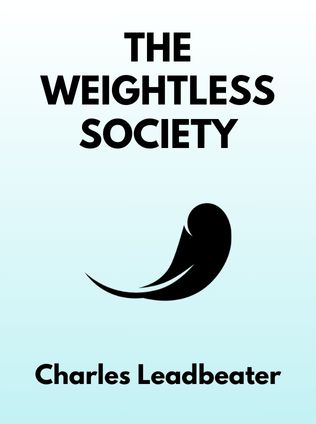
The Weightless Society
By Charles Leadbeater
Published 10/2000
The Weightless Society: Living in the New Economy Bubble
By Charles Leadbeater
About the Author
Charles Leadbeater is a renowned writer, consultant, and advisor to Prime Minister Tony Blair's Downing Street Policy Unit. He is well-known for his insightful analysis of the knowledge economy and its impact on modern society. His work focuses on how organizations can harness the power of knowledge to drive innovation and economic growth. In "The Weightless Society," Leadbeater explores these themes in depth, providing a comprehensive roadmap for creating institutions that can thrive in the new economy.
Main Idea
"The Weightless Society" delves into the shift towards a knowledge-driven economy, where traditional physical products are increasingly replaced by services, information, and ideas. Leadbeater argues that this new economy requires radical innovation in political, social, and economic institutions. He presents a vision of a thriving knowledge society that is cosmopolitan, open, and democratic, rewarding talent and creativity while investing in people and education. The book outlines the challenges and opportunities of living in a "weightless" society and offers strategies for navigating this new economic landscape.
Table of Contents
- Living on Thin Air
- The Driving Forces of the Knowledge Economy
- A Piece of Cake
- Knowing to Compete
- Corporate Collapse
- Creating Knowledge
- Evolutionary Innovation
- Entrepreneurve
- The Networked Economy
- The Intelligent Region
- The Ethic of the New Economy
- Who Should Own Knowledge?
- Is the New Economy Green?
- Creating Social Capital
- Closing Thoughts
Living on Thin Air
Our modern economy is increasingly driven by the generation, application, and exploitation of knowledge. Unlike the industrial era, where physical goods were the primary source of economic value, today's economy is "weightless" - it is built on services, judgment, information, and analysis. This shift has profound implications for how we live and work.
"The turbulent economy in which we all make our living constantly throws things out of kilter. At times we seem blessed. The generation, application, and exploitation of knowledge is driving modern economic growth." - Charles Leadbeater
Leadbeater highlights the contrast between our knowledge-rich society and the sense of uncertainty many people feel. Despite the abundance of information, institutions seem paralyzed, unable to keep pace with the rapid changes. He argues for a wave of radical innovation in political, social, and economic institutions to unleash the benefits of the knowledge economy.
The Driving Forces of the Knowledge Economy
Leadbeater identifies three key forces driving the new economy: financial capitalism, knowledge capitalism, and social capital.
- Financial Capitalism: The global financial system moves vast resources instantly, creating both opportunities and risks. The challenge is to maintain beneficial investment flows while managing speculative excess.
- Knowledge Capitalism: The drive to generate and commercialize new ideas is the dynamo behind rising living standards and economic growth. Collaboration is essential for creativity in knowledge capitalism.
- Social Capital: Trust and collaboration reduce the risks inherent in the new economy. A successful society must be innovative and inclusive, investing in education and social solidarity.
"The task is to combine finance, knowledge, and social capital in a virtuous circle of innovation, growth, and social progress." - Charles Leadbeater
A Piece of Cake
Leadbeater uses the example of a cookbook to illustrate the power of the knowledge economy. Cookbooks represent a massive transfer of knowledge, distilling the expertise of a few into a resource for millions. This commoditization of knowledge allows for widespread dissemination and utilization.
"Each year at Christmas, millions of people give cookbooks. This exchange is an annual, global knowledge transfer on a vast scale." - Charles Leadbeater
He distinguishes between tacit knowledge, which is acquired through experience, and explicit knowledge, which is codified in books and reports. Both forms are essential, but explicit knowledge allows for faster and broader dissemination.
Sign up for FREE and get access to 1,400+ books summaries.
You May Also Like
Rich Dad Poor Dad
What the Rich Teach Their Kids About Money - That the Poor and Middle Class Do Not!
By Robert T. KiyosakiFreakonomics
A Rogue Economist Explores the Hidden Side of Everything
By Steven D. Levitt and Stephen J. DubnerI Am Malala
The Story of the Girl Who Stood Up for Education and Was Shot by the Taliban
By Malala YousafzaiThe Lean Startup
How Today's Entrepreneurs Use Continuous Innovation to Create Radically Successful Businesses
By Eric RiesWho Moved My Cheese?
An Amazing Way to Deal with Change in Your Work and in Your Life
By Spencer Johnson, M.D.Factfulness
Ten Reasons We're Wrong About the World – and Why Things Are Better Than You Think
By Hans Rosling



















